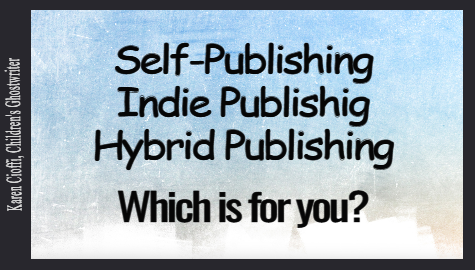Most of my clients take the self-publishing road. It’s important, though, to understand what self-publishing means as there are other terms in the arena: indie authors and hybrid publishing.
It’s important to know the difference before jumping in.
Self-Publishing
Self-publishing is kind of a catch-all for anyone who writes a story and takes it through to publishing and distribution.
This includes formatting and designing the book, creating print-ready files and uploading to aggregators like IngramSpark and/or retailers like Amazon for distribution and sales.
This is not to say the author has to do everything herself, she may hire services to help with some of the phases.
All the costs are on the authors’ shoulders.
In this group, creating a book does not necessarily mean the author intends to sell it. It could be for family, friends, a specific event, etc.
This group is a mix of everyone who produces a book on their own whether for sale of not. It includes one-time writers and career writers.
It also includes less than professional writers, those who don’t take the time or put in the effort to learn how to write before putting their name on the book cover and publishing it.
The unprofessional authors in this group is why self-publishing still has somewhat of a stigma to it. There are a lot of terrible self-published books.
Indie Publishing
Originally, indie publishing was a term used for small publishers, like the home-grown, mom and pop publishers that filled in the cracks of the 5 large publishers. And it still is, somewhat.
Lately, though, the term is more in line with the author who does it all on his own.
According to Alliance of Independent Authors (ALLi), “An indie author is a writer of fiction, nonfiction, or poetry books who self-publishes their own work and retains and controls their own publishing rights.”
You may pause here and question: Isn’t that the same as self-publishing?
The answer is yes and no.
Self-publishing encompasses everyone who takes control of publishing their book.
But indie authors specifically write and publish with the intent to make money, hopefully to make a living at it. They’re in it for the long haul and take pride in their books.
These authors spend the time and put in the effort to get it right.
-They learn how to write.
-They learn about the genre they’re writing in.
-They learn about revisions, editing, and proofreading their work.
-They learn the process of going through to publication.
This doesn’t mean they do it all themselves. The author may hire a formatter or a designer. And if writing a children’s picture book, she will hire a professional illustrator, unless she is a professional illustrator.
I’m sure some indie authors hire quality publishing companies to help them from formatting to publishing to distribution.
But they are in control and it’s a business to them.
Hybrid Publishing
Hybrid publishing is a newer publishing model.
This publishing path is a combination of traditional publishing and self-publishing. It’s a partnership between the publisher and the author.
The publisher is vested in the author’s success because they invest in the book by covering some of the expenses.
The author covers whatever the hybrid publisher doesn’t cover. How much depends on the company, so always read your contract.
Hybrid publishing provides a more affordable avenue outside of the traditional publishing road, which keeps getting more and more difficult to get on to.
It is important to be careful, though, as there are a lot of scam services out there. Some are vanity presses with a new title. It’s up to you to do your research and know who you’re dealing with.
Look for a service with a track record, one that knows what they’re doing and is in line with industry standards.
A tell-tale mark they’re legit is a quality service will publish under their own imprint with their own ISBNs.
Decisions, Decisions, Decisions
Think carefully about how you want to enter the self-publishing arena.
Choose the type of publishing that will work best for you. Sometimes budget is the deciding factor, especially if you’re writing children’s picture books or even chapter books. These books need illustrations which can be costly.
If you take the hybrid road, look for a quality service. The same goes for self-publishing and indie publishing to work with.
There are probably more scam services than legit services out there, so again be careful.
References:
(1) https://www.allianceindependentauthors.org/what-is-an-indie-author/
(2) https://www.masterclass.com/articles/how-to-use-hybrid-publishing-to-get-your-novel-published#quiz-0
I’m a working children’s ghostwriter, rewriter, and coach. I can help turn your story into a book you’ll be proud to be author of. You can contact me at: kcioffiventrice@gmail.com. Or, you can give me a call at 834—347—6700
If you’d rather do-it-yourself, check out my book, How to Write a Children’s Fiction Book.



1 thought on “Self, Indie, and Hybrid Publishing – Which is for You?”